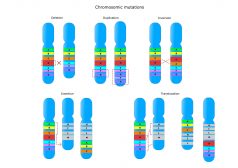Definition
noun
A catalytic decomposition of a chemical compound by reaction with water, such as the conversion of cellulosic materials into fermentable sugars by the addition of specific enzymes.
Supplement
This process is used to convert starch and cellulose in plant stalks, leaves, wood fiber, and other biomass into glucose by the addition of enzymes, e.g. cellulase.
It is also used for the breakdown of proteins into amino acids by the addition of proteases.
See also: enzyme, hydrolysis.
Dictionary > Enzymatic hydrolysis
You will also like...

Chromosome Mutations
Mutations can also influence the phenotype of an organism. This tutorial looks at the effects of chromosomal mutations, ..

Running Water Freshwater Community Factors
This tutorial noted some of the physical and chemical factors that provide the framework of a running water community in..

Genetic Mutations
This tutorial looks at the mutation at the gene level and the harm it may bring. Learn about single nucleotide polymorph..

Birth Control and Contraception
Different pregnancy and birth control and contraception strategies are described. Read this tutorial to learn each of th..

Temperature Regulation in Animals
This tutorial elucidates body temperature regulation. Know the details here to learn how the body sets the body temperat..

Freshwater Communities & Lentic Waters
Lentic or still water communities can vary greatly in appearance -- from a small temporary puddle to a large lake. The s..

